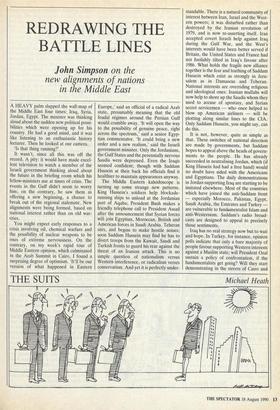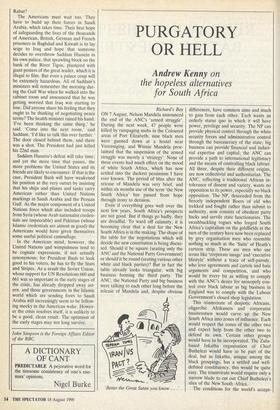REDRAWING THE BATTLE LINES
John Simpson on the
new alignments of nations in the Middle East
A HEAVY palm slapped the wall-map of the Middle East four times: Iraq, Syria, Jordan, Egypt. The minister was thinking aloud about the sudden new political possi- bilities which were opening up for his country. He had a good mind, and it was like listening to an enthusiastic history lecturer. Then he looked at our camera.
'Is that thing running?'
It wasn't, since all this was off the record. A pity: it would have made excel- lent television to watch a member of the Israeli government thinking aloud about the future in the briefing room which his fellow-ministers use at times of crisis. The events in the Gulf didn't seem to worry him; on the contrary, he saw them as offering a new beginning, a chance to break out of the regional stalemate. New alignments were being formed, based on national interest rather than on old war- cries.
You might expect early responses to a crisis involving oil, chemical warfare and the possibility of nuclear weapons to be ones of extreme nervousness. On the contrary, on my week's rapid tour of Middle Eastern opinion, which culminated in the Arab Summit in Cairo, I found a surprising degree of optimism. 'It'll be our version of what happened in Eastern Europe,' said an official of a radical Arab state, presumably meaning that the old feudal regimes around the Persian Gulf would crumble away. 'It will open the way to the possibility of genuine peace, right across the spectrum,' said a senior Egyp- tian commentator. 'It could bring a new order and a new realism,' said the Israeli government minister. Only the Jordanians, the Gulf States and the perennially nervous Saudis were depressed. Even the Iraqis seemed confident; though with Saddam Hussein at their back his officials find it healthier to maintain appearances anyway.
The Middle Eastern kaleidoscope is turning up some strange new patterns. King Hussein's soldiers help blockade- running ships to unload at the Jordanian port of Aqaba; President Bush makes a friendly telephone call to President Assad after the announcement that Syrian forces will join Egyptian, Moroccan, British and American forces in Saudi Arabia. Teheran stirs, and begins to make hostile noises; soon Saddam Hussein may find he has to divert troops from the Kuwait, Saudi and Turkish fronts to guard his rear against the threat of an Iranian attack. This is no simple question of nationalism versus Western interference, or radicalism verses conservatism. And yet it is perfectly under- standable. There is a natural community of interest between Iran, Israel and the West- ern powers; it was disturbed rather than destroyed by the Iranian revolution of 1979, and is now re-asserting itself. Iran accepted covert Israeli help against Iraq during the Gulf War, and the West's interests would have been better served if Britain, the United States and France had not foolishly tilted in Iraq's favour after 1986. What holds the fragile new alliance together is the fear and loathing of Saddam Hussein which exist as strongly in Jeru- salem as in Damascus and Teheran. National interests are overriding religious and ideological ones: Iranian mullahs will now help to shore up the Saudis whom they used to accuse of apostasy, and Syrian secret servicemen — who once helped to blow up American airliners — will be plotting along similar lines to the CIA. Only Saddam Hussein, you might say, can do this.
It is not, however, quite as simple as that. These switches of national direction are made by governments, but Saddam hopes to appeal above the heads of govern- ments to the people. He has already succeeded in neutralising Jordan, which (if King Hussein had had a free hand) would no doubt have sided with the Americans and Egyptians. The daily demonstrations in Jordan supporting Iraq are starting to be imitated elsewhere. Most of the countries which have joined the anti-Saddam front — especially Morocco, Pakistan, Egypt, Saudi Arabia, the Emirates and Turkey — are vulnerable to fundamentalist Islam and anti-Westernism. Saddam's radio broad- casts are designed to appeal to precisely those sentiments.
Iraq has no real strategy now but to wait and hope. In Turkey, for instance, opinion polls indicate that only a bare majority of people favour supporting Western interests against a Muslim state; will President Ozal sustain a policy of confrontation, if the fundamentalists get going? Will they start demonstrating in the streets of Cairo and Rabat?
The Americans must wait too. They have to build up their forces in Saudi Arabia, which takes time. Their best hope of safeguarding the lives of the thousands of American, British, German and French prisoners in Baghdad and Kuwait is to lay seige to Iraq and hope that someone decides to overthrow Saddam Hussein in his own palace, that sprawling block on the bank of the River Tigris, plastered with giant posters of the great leader, which it is illegal to film. But even a palace coup will be extremely hazardous. All of Saddam's ministers will remember the morning dur- ing the Gulf War when he walked into the cabinet room and announced that he was getting worried that Iraq was starting to lose. Did anyone share his feeling that they ought to be thinking of negotiating peace terms? The health minister raised his hand. 'I've been thinking the same thing,' he said. 'Come into the next room,' said Saddam, `I'd like to talk this over further.' The door closed behind them, and there was a shot. The President had just killed his 22nd man.
Saddam Hussein's defeat will take time; and yet the more time that passes, the more problems the United States and its friends are likely to encounter. If that is the case, President Bush will have weakened his position at the very outset by insisting that his ships and planes and tanks carry American rather than United Nations markings in Saudi Arabia and the Persian Gulf. As the major component of a United Nations force which also included troops from Syria (whose Arab nationalist creden- tials are impeccable) and Pakistan (whose Islamic credentials are almost as good) the Americans would have given themselves some useful political camouflage.
In the American mind, however, the United Nations and wimpishness tend to be cognate expressions, if not actually synonymous; for President Bush to look good to his voters, he has to fly the Stars and Stripes. As a result the Soviet Union, whose support for UN Resolutions 660 and 661 was so important in the early stages of the crisis, has already dropped away ast- ern, and those governments in the Islamic world which are sending fores to Saudi Arabia will increasingly seem to be follow- ing meeky in the American wake. Howev- er the crisis resolves itself, it is unlikely to be a good, clean result. The optimism of the early stages may not long survive.
John Simpson is the Foreign Affairs Editor of the BBC.



























































 Previous page
Previous page